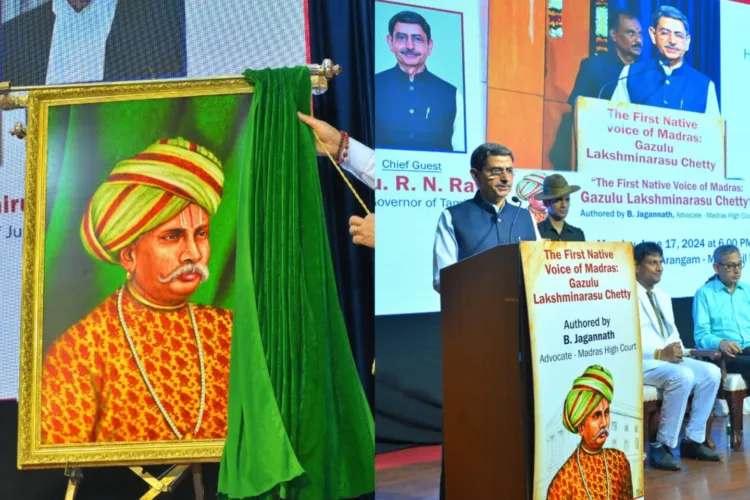Tamil Nadu Governor R N Ravi has criticised the colonial rulers for introducing the Dravidian concept, accusing them of creating a false narrative to divide the nation for their own benefit. “Dravidian is a geographical division, not a racial one. The British fabricated this history as part of their divide-and-rule policy,” he stated.
Governor Ravi made these remarks while launching the book “The First Native Voice of Madras: Gazulu Lakshminarasu Chetty” on the evening of June 16 in Chennai. During his speech, he elaborated on the book’s subject, shedding light on the contributions of Gazulu Lakshminarasu Chetty, an unsung hero of the freedom struggle.
Governor Ravi, while discussing the historical education system in India, remarked, “Teaching was once considered a noble profession, not a business. Brahmins, who were often economically disadvantaged, predominantly took on the role of educators. This inclusive system of education was systematically dismantled by the British.”
He highlighted that since 1823, education in the Madras province was imparted without any discrimination based on caste, religion, or gender. Various institutions taught Tamil, Kannada, Malayalam, Sanskrit, and other subjects according to their convenience. “In the 1820s, our society’s education system was free for students, and there was no caste system before the British established their business empire,” he emphasised.
Governor R.N. Ravi, addressing the historical education system in India, debunked the false narratives about Dravidian stocks. He stated, “Shudras were more educated than Brahmins in mother tongue education, highlighting the widespread access to education across social strata.” He emphasised the British government’s efforts to systematically dismantle the native education system, which was extensive and inclusive. “Social justice and free education in the mother tongue were prevalent in India before the British arrived. They deliberately destroyed our mother tongue-based education to promote their English,” he said.
Governor Ravi made these remarks while launching the book “The First Native Voice of Madras: Gazulu Lakshminarasu Chetty” on the evening of June 16 in Chennai. The event celebrated the unsung freedom struggle hero, shedding light on his contributions.
Chief Justice of Meghalaya High Court, S. Vaidyanathan, commended the author, B. Jagannath, an advocate who has worked tirelessly to bring attention to this hidden hero. He highlighted that Chetty was the first Indian to set up a printing press and run a newspaper.
Author B. Jagannath, known for his legal battles against the misadministration in Hindu Religious and Charitable Endowments (HR&CE) and for protecting temple properties, expressed gratitude to Governor Ravi for his praise. Jagannath detailed his extensive research efforts, sourcing information from the British Library, Imperial Library, and the Connemara Library. The Centre for South Indian Studies has published the book in English, Telugu, and Tamil.
Jagannath reiterated, “Since 1823, education in the Madras province was imparted without caste, religion, or gender disparity. Institutions teaching Tamil, Kannada, Malayalam, Sanskrit, and other subjects operated according to their convenience. In the 1820s, our society’s education system was free for students, categorised into four divisions: Brahmins, Kshatriyas, Vaishyas (Baniyas), and Shudras. Muslims were also present, but there were no castes as we understand today. The caste system was a British invention.”
He thanked Governor Ravi for his candid appreciation of the book, stating, “I am truly honored and blessed by the Governor’s praise. His endorsement made this event a super success. Governor Ravi read the book in full and found it inspiring, encouraging further research into our freedom fighters.”
During a well-organised event, attendee Kesava Bashyam praised Governor R.N. Ravi’s impassioned speech, where he fiercely criticised the historical misrepresentations of 19th-century “B-stocks” and humorously condemned the “D-stocks” of the 20th and 21st centuries. Ravi expressed deep disappointment over the systematic erasure of the true history of Indian patriots from public consciousness, particularly within university settings, where he noted a deliberate omission of the heroics of freedom fighters. He questioned the efficacy of the Central Government, both during its majority rule and in coalition, in addressing these concerns, lamenting the lack of action despite his vocal advocacy.
Who is Gazulu Lakshminarasu Chetty?
Gazulu Lakshminarasu Chetty, renowned as the Father of Printing in India, founded the Madras Crescent Printing Press, a pivotal institution in the history of printing and publication. His pivotal role came to light when he opposed the inclusion of the Bible in school curricula by British Christian missionaries, sparking debates in the House of Commons that ultimately led to the initiative’s abandonment. Chetty’s advocacy extended through the Madras Native Association and its publication arm, Madras Crescent, where he emerged as a vocal advocate for native rights in a democratic and non-violent manner. His efforts catalysed the first organised political movement in Madras, prompting significant reforms including the establishment of the Royal Enquiry Commission for Torture.
Governor Ravi commended the author for the comprehensive coverage in the book, particularly highlighting the survey commissioned by Munroe on educational institutions. This survey underscored that education was community-managed, supported by tax-free community land. However, Munroe’s policies imposed taxes on much of this land, severely disrupting the educational structure. Governor Ravi underscored the 19th century as a period marked by severe oppression, forced conversions, and the British-led slave trade.
This event not only celebrated Chetty’s legacy but also underscored the ongoing battle to preserve and promote accurate historical narratives in the face of colonial distortions. Governor Ravi’s impassioned call for governmental action resonated strongly, urging a reevaluation of educational policies and a commitment to honoring the unsung heroes of India’s freedom struggle.



















Comments